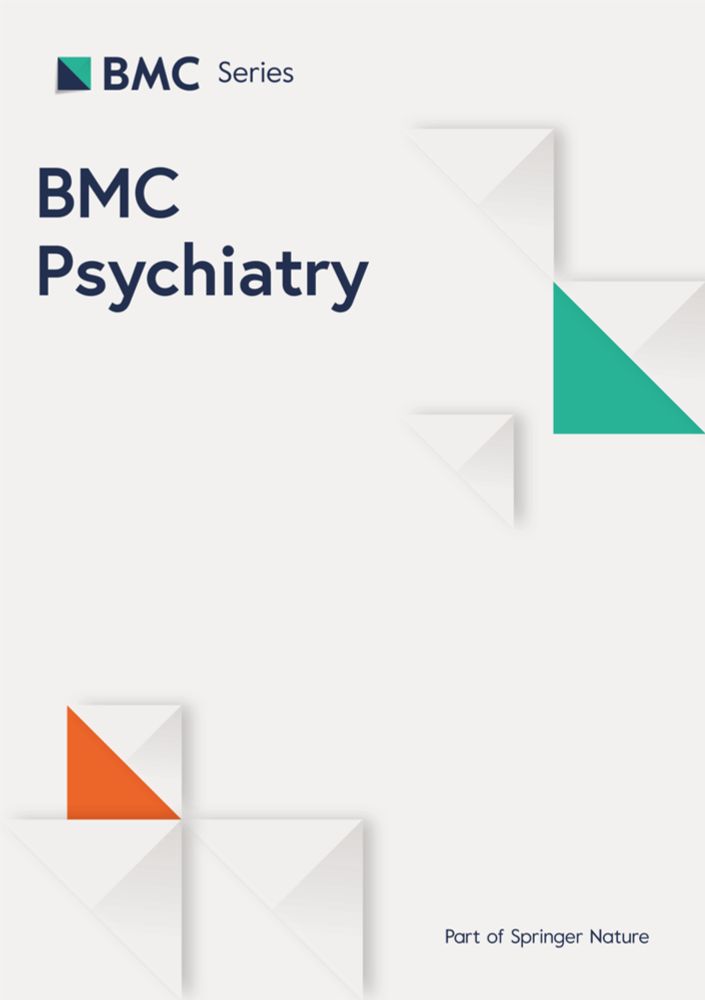bmcpsychiatry.biomedcentral.com/articles/10....
Another study we did using data from a German clinic
journals.plos.org/plosone/arti...
After the many rejections of both manuscripts, which I did not experience before, I decided to move away from LGB-related research.

bmcpsychiatry.biomedcentral.com/articles/10....
Another study we did using data from a German clinic
journals.plos.org/plosone/arti...
After the many rejections of both manuscripts, which I did not experience before, I decided to move away from LGB-related research.
🙏 Huge thanks to my brilliant co-authors at @uclpals.bsky.social & @uclpsychiatry.bsky.social
Thanks also to the NHS Talking Therapies patients whose care journeys made this study possible, the clinicians who provided that care, & the LGB service users & therapists we consulted.
🙏 Huge thanks to my brilliant co-authors at @uclpals.bsky.social & @uclpsychiatry.bsky.social
Thanks also to the NHS Talking Therapies patients whose care journeys made this study possible, the clinicians who provided that care, & the LGB service users & therapists we consulted.
🗣️ We consulted LGB service users and therapists to help interpret the findings.
They spoke of openness toward therapy and strong motivation to engage.
Many saw it as a rare space to feel safe, understood, and supported — which may help explain these outcomes, despite high distress levels.
🗣️ We consulted LGB service users and therapists to help interpret the findings.
They spoke of openness toward therapy and strong motivation to engage.
Many saw it as a rare space to feel safe, understood, and supported — which may help explain these outcomes, despite high distress levels.
📊 Bisexual men were less likely to drop out than heterosexual men (26.6% vs 29.7%).
Bisexual women also dropped out less often than heterosexual women (24.2% vs 26.8%).
Lesbian and bisexual women attended more sessions — but the difference was negligible (≈1 extra per 100 patients).
📊 Bisexual men were less likely to drop out than heterosexual men (26.6% vs 29.7%).
Bisexual women also dropped out less often than heterosexual women (24.2% vs 26.8%).
Lesbian and bisexual women attended more sessions — but the difference was negligible (≈1 extra per 100 patients).
📈 Gay men showed slightly greater reductions in depression and anxiety symptoms.
These differences are unlikely to be noticeable for most individuals — but at group level, recovery was higher (54.0% vs 47.5%) and dropout lower (25.5% vs 29.7%) than for heterosexual men.
📈 Gay men showed slightly greater reductions in depression and anxiety symptoms.
These differences are unlikely to be noticeable for most individuals — but at group level, recovery was higher (54.0% vs 47.5%) and dropout lower (25.5% vs 29.7%) than for heterosexual men.
🔍 Want more detail? Here’s how outcomes varied slightly between LGB subgroups.
These differences were small overall — but worth unpacking.
🔍 Want more detail? Here’s how outcomes varied slightly between LGB subgroups.
These differences were small overall — but worth unpacking.
✅ The good news? LGB patients did just as well.
They improved at similar rates, were just as likely to recover, and just as likely to stay in therapy as heterosexual patients.
✅ The good news? LGB patients did just as well.
They improved at similar rates, were just as likely to recover, and just as likely to stay in therapy as heterosexual patients.
🧠 We analysed 94,239 patients in NHS Talking Therapies across North and East London who disclosed their sexual orientation.
7,422 identified as lesbian, gay or bisexual (LGB).
We compared their therapy outcomes and engagement to heterosexual patients.
🧠 We analysed 94,239 patients in NHS Talking Therapies across North and East London who disclosed their sexual orientation.
7,422 identified as lesbian, gay or bisexual (LGB).
We compared their therapy outcomes and engagement to heterosexual patients.
🏳️🌈 LGB people experience higher rates of depression & anxiety — but do they have similar outcomes in therapy?
Previous research raised concerns about poorer outcomes for bisexual men and women, and for lesbian women.
We re-examined this using a larger and more recent dataset from London services.
🏳️🌈 LGB people experience higher rates of depression & anxiety — but do they have similar outcomes in therapy?
Previous research raised concerns about poorer outcomes for bisexual men and women, and for lesbian women.
We re-examined this using a larger and more recent dataset from London services.

